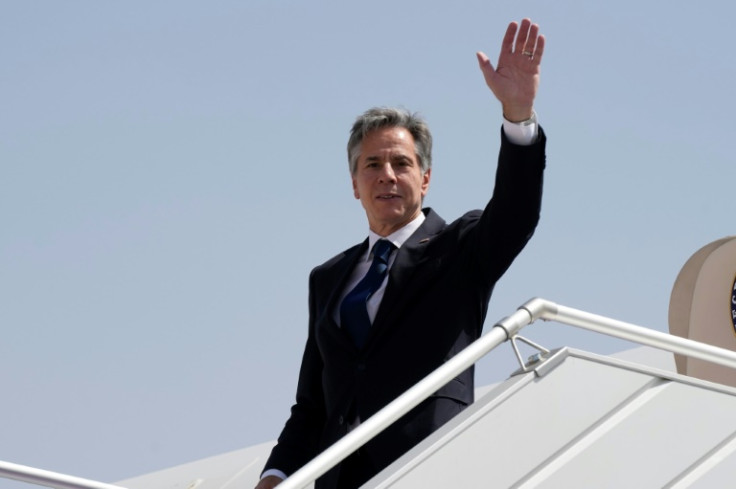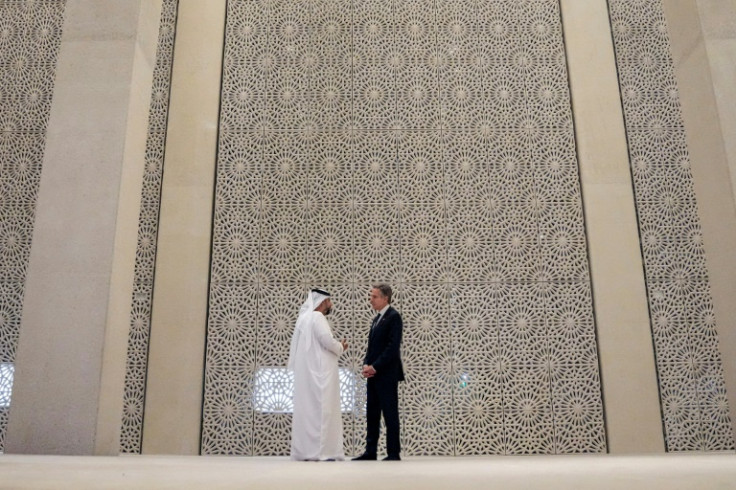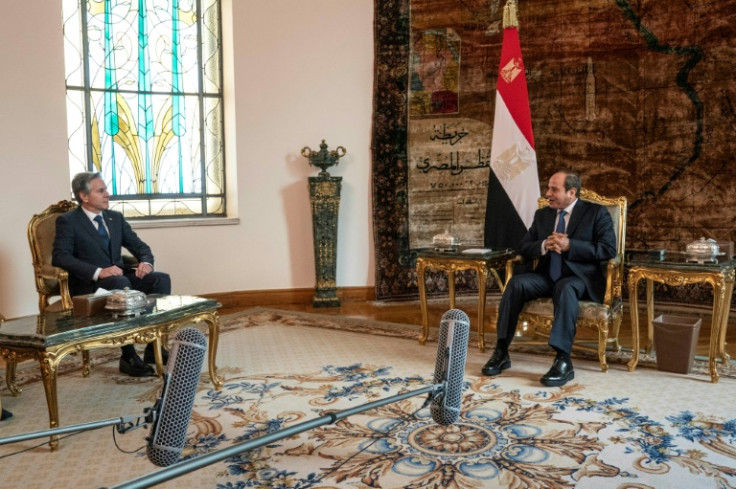Blinken Woos Uneasy US Allies In Saudi, Egypt To Pressure Hamas

US Secretary of State Antony Blinken on Sunday took his campaign to pressure Hamas to the leaders of Egypt and Saudi Arabia, both eager to highlight their influence faced with at times uneasy alliances with Washington.
Since Hamas militants' bloody October 7 assault on Israel, which has launched relentless air strikes on Gaza in retaliation, Blinken has toured seven Middle Eastern countries in support of Israel, where he will return Monday.
Blinken said he found talks productive with Egyptian President Abdel Fattah al-Sisi and Saudi Crown Prince Mohammed bin Salman and acknowledged that the two focused more on the plight of the Palestinians as Israel prepares a ground invasion.
Speaking to reporters before flying out of Cairo, Blinken said he heard "a lot of good ideas about some of the things we need to do moving forward, including practical ideas on getting assistance to Palestinians in Gaza who are in need".
Egypt was the first Arab country to make peace with Israel in 1979, and has been one of the top recipients of US assistance ever since.
Saudi Arabia in recent months has been seeking US incentives including formal security guarantees as it considers normalising with Israel, although the kingdom put the talks on hold after the violence.
Sisi and Prince Mohammed have faced heated US criticism over their human rights records -- and both leaders made clear to Blinken they were in charge.
Blinken waited throughout the night in Riyadh to meet Prince Mohammed, who finally saw him shortly after dawn at his private farm estate.
Sisi opened his meeting by referencing how Blinken, on his visit to Israel on Thursday, spoke of his own Jewish heritage.
"You spoke as a Jewish person, and let me tell you that I am an Egyptian citizen, and I was born and brought up in a neighbourhood where we had Jewish neighbours," Sisi told him.
"Jews who used to live here in Egypt never suffered oppression," Sisi said.
Egypt's ancient Jewish community virtually disappeared after the 1956 Suez crisis, in an exodus following violence.
Blinken has hoped on his tour of Arab nations to build pressure against Hamas and to prevent the conflict from spreading to Israel's northern border.
Blinken said that Arab leaders told him they would do "everything possible to make sure this doesn't spread to other places". But he also heard vocal calls to look more at the plight of the Palestinians.
Sisi told Blinken that "Israel's response has gone beyond the right to self-defence and amounts to collective punishment", as the United Nations warned of worsening humanitarian conditions in Gaza.
Cairo has sought to work with Washington since the violence broke out. But an agreement outlined by US officials to let foreigners, including US citizens, leave Gaza through the Rafah border crossing has failed to come to fruition.
Blinken after talks with Sisi voiced confidence that Rafah will be reopened and said that the United States, UN, Egypt, Israel and others were working on ways to bring aid out through Rafah.
US officials have backtracked on encouraging Egypt to take in Gazan refugees, amid calls by some Israeli politicians for the mass movement of Palestinians to Egypt's sparsely populated Sinai peninsula, which was previously occupied by Israel and has more recently been the site of a multi-year fight against Islamist insurgents.
Palestinian president Mahmud Abbas warned Blinken on Friday that the displacement of Gazans would amount to a "second Nakba" -- when over 760,000 Palestinians were expelled from their lands in the creation of Israel in 1948.
Despite Egypt's refusal to take in refugees, some analysts have said the issue could be a potential bargaining chip in view of the dire economic situation in the Arab world's most populous country.
Egypt's currency has lost half its value in a year, under a crippling foreign debt bill and an economic crisis that analysts warn is only set to worsen.
Egypt has pushed for diplomacy and said it planned a summit on "the future of the Palestinian cause", although it did not announce a date.
Blinken said that "these kinds of initiatives are good ideas".
Egypt has recently come under new pressure in Washington with a top senator, Ben Cardin, holding up $235 million as he seeks the release of political prisoners.
In Saudi Arabia, President Joe Biden had once vowed to treat Prince Mohammed as a pariah after US intelligence linked him to the 2018 killing and dismemberment of Jamal Khashoggi, a US-based Saudi journalist.
Riyadh denies the charges, blaming rogue operatives.


© Copyright AFP 2025. All rights reserved.





















